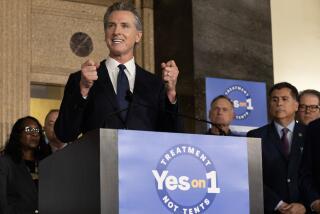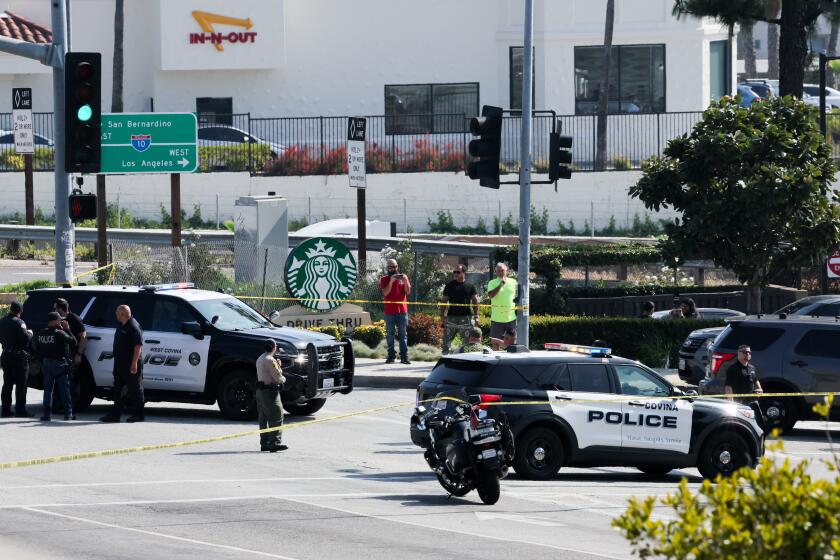Poll: Voters skeptical of state reform proposals
Backers of an overhaul of California’s government, who hope to leverage disgust with Sacramento into support for changing how the state raises taxes and spends money, have a difficult path ahead, according to a new poll of California voters.
Major segments of the electorate see the state’s problems as the product of unrestrained lawmakers driven by special interests to waste taxpayer money, and reject arguments that structural issues with the state’s Constitution and government institutions are to blame.
Voters don’t want the tax code overhauled in the ways that many fiscal experts promise would tamp down the wild revenue swings that have led to a constant state of budget crisis in California. They don’t want the Constitution changed to allow a simple majority of lawmakers to push a budget onto the governor’s desk, as most other large states allow. And they don’t want the state to touch Proposition 13 property tax restrictions, even if residential property taxes would remain strictly limited.
The poll results come at a time when large numbers of Californians report significant economic stress as a result of the recession.
More than a third of those polled said they or a family member had lost a job in the last year. Nearly half said they or someone in their family had been hit with a cut in take-home pay, and 57% said their investments or those of family members had dropped by more than a quarter.
The recession’s impact is particularly strong among blacks and Latinos, with 57% of Latinos and 41% of blacks in the survey saying they or someone in their family had lost a job as a result of the recession. Among Latinos, 21% reported a home foreclosure, a number more than twice the overall rate of those surveyed.
Nearly a quarter of those polled said they or someone in their family had lost healthcare coverage as a result of the recession. And 27% said they or someone in their family had put off or canceled a medical appointment or prescription in the last year because of the cost.
The findings come from a new Los Angeles Times/USC College of Letters, Arts and Sciences poll. The survey of 1,500 registered voters from Oct. 27 to Nov. 3 was conducted by two nationally prominent polling agencies, the Democratic firm Greenberg Quinlan Rosner and the Republican firm Public Opinion Strategies. The results have a margin of sampling error of +/- 2.6 percentage points.
The fact that the poll surveyed registered voters could have affected the findings regarding the recession. As compared with all adult Californians, those who are registered to vote are, on average, older, less Latino and better-situated financially.
Amid tough times, “voters seem uninterested in budgetary innovation,” said Stan Greenberg, one of the two pollsters who supervised the survey. His Republican counterpart, Neil Newhouse, concurred, saying the poll indicated widespread voter “distrust” of proposed reforms, in favor of a focus on cutting spending and reducing the power of special interests.
A nonpartisan commission of experts appointed by the governor and legislative leaders recently proposed a series of measures to help stabilize the state’s finances. The poll found those to be unpopular.
A solid majority, 65%, opposed plans to place sales tax-like levies on services such as legal advice and car repairs. A proposal to flatten the income tax to make the state less dependent on the wealthy was opposed by 48% of voters and supported by just 33%. The nonpartisan panel had endorsed the argument made by many budget experts that income taxes from wealthy residents make state finances too erratic because they rise and fall dramatically as the stock market moves.
Another proposal being pushed by budget reformers, although not the commission, would ease the restrictions on property tax increases put in place three decades ago by Proposition 13. That idea was also unpopular. Just 30% of voters support such changes even if they would affect only commercial property and not residences.
“They keep taxing and taxing and taxing,” said one of the poll respondents, William Owen, 49, an attorney from Orange County who is registered as unaffiliated. “They can’t even control the money they already have. . . . And all we’re paying for are things like more and more illegal immigration.”
A significant minority of voters in the poll expressed frustration with illegal immigration, a subject that has come to the forefront in California politics during previous periods of economic difficulty.
The poll asked respondents to choose between two proposals for changing the nation’s immigration laws: “allow some people who have come to this country illegally to become citizens if they have clean records” and meet other requirements or “emphasize stronger enforcement of border controls and deport people who are here illegally.”
The deportation option won support of 39%, including 61% of registered Republicans, 57% of self-identified conservatives and 51% of voters in the Southern California counties outside of Los Angeles.
A greater number, 54%, said they support allowing some people who are here illegally to become citizens.
“It’s a bit silly to say, ‘You are here, and you are working, now let’s get you out,’ ” said Diane Kirkland, 50, a self-employed clothing designer from Altadena and registered Democrat who took part in the poll. “There has to be some way to let more people -- not all -- stay here legitimately.” That position won the strongest support among registered Democrats, Latinos, voters under 30 and those living in the San Francisco Bay Area.
As for easing the gridlock in Sacramento, one proposal often touted by reformers received only meager support in the poll. Only 37% supported a plan to scrap the constitutional requirement that two-thirds of the Legislature sign off on any spending plan and shift to a majority-vote rule; 54% preferred to keep the two-thirds supermajority. No other large state requires such a high threshold of legislative votes to approve a budget.
The majority-vote proposal won support from 51% of self-described liberals, but otherwise lost across the ideological spectrum, among registered Democrats as well as Republicans, in all major racial and ethnic groups and in all regions of the state.
“I don’t think any one party should have complete control over anything,” said Barbara Eagleston, 54, a Republican homemaker in Tracy, noting that with the current makeup of the Legislature, Democrats would have complete control of budget passage under a majority-vote rule. “The budget should always need support of both parties.”
Bob Hertzberg, a former Assembly Speaker and a leader of California Forward, a group championing the majority-vote plan, said he was not discouraged by the poll results. He said California Forward has held several focus groups in which voters initially opposed changing the vote threshold but would support it as part of a bigger reform package that would leave the two-thirds rule in place for tax hikes.
“People think it means it will be easier for Sacramento to raise taxes,” he said. But he argued “this is a very important first step in stopping some of the craziness in Sacramento and bringing sanity back to the process.”
Some voters, albeit a minority, agree.
“This last budget season shows you the system they have doesn’t work,” said Long Beach resident Deborah Ossege, 57, a consultant to a software company and registered Democrat. “They couldn’t get anyone to move off the dime. It is a constant stalemate. For those of us watching from afar, it is just ridiculous.”
More to Read
Start your day right
Sign up for Essential California for news, features and recommendations from the L.A. Times and beyond in your inbox six days a week.
You may occasionally receive promotional content from the Los Angeles Times.







